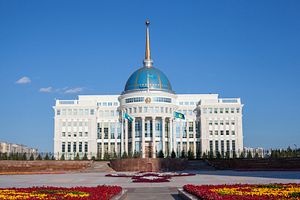The growth and strength of civil society in Kazakhstan is one of the clearest symbols of the country’s progress since independence. There are now, according to government figures, well over 30,000 independent civil society groups, which work across a diverse range of issues from providing social and community help to promoting human rights and championing environmental causes.
This growth has been actively encouraged by the government as a vital part of continuing to build a modern, progressive and democratic country. State funding has been provided to support the development of civil society groups and to help them take over increasing roles in the country. Government bodies seek their advice and involvement, locally and nationally, to help improve policy.
With this increasing role, of course, comes increased responsibility and accountability to demonstrate that government money is being used wisely as well as to ensure grants are being given fairly. This becomes even more vital as the Kazakh government continues its drive to devolve more decision-making to local level and to non-state bodies. In recent years, however, there have been examples where NGOs have spent public funds well outside what was intended.
It is against this background that the present piecemeal laws that govern NGOs in Kazakhstan are being streamlined and modernized. This will usher in a new level of transparency into the way government grants are distributed – through the creation of a new non-government body to oversee it – but will also require civil society organizations as well to make public information about their own financing and where and how the money is spent.
This requirement has raised concerns both within Kazakhstan and abroad. Fears have been raised that the intention is to muzzle the work of the NGOs within our country or to prevent them continue to receive support from international bodies or partners. This is simply not the case.
The new law does not change the legal framework for NGOs, increase their requirements to register officially, change their tax-free status or allow the government to interfere in their work. It will continue to be NGOs themselves, which decide how their money should be spent.
The role of the new body to oversee the distribution of central grants – which will be made up of a mix of government officials and representatives from civil society – will be limited. It is not intended to monitor NGOs but instead advise government where its grants should be distributed and make public where government money goes. By bringing this into the open, it will increase public confidence and tackle concerns about favoritism. It can also act as a clearing house for wider donations.
But there is no intention of preventing civil society groups from receiving, as they can now, financial support from private donations or outside our national borders. The EU, the U.S., as well as international NGOs have played an essential role in helping increase the capacity, vibrancy and robustness of our civil society just as outside investment and expertise has been vital for our economic progress. We want to see this continue – and to increase the funding from non-government sources within our country – not prevent it.
So unlike some neighboring states, for example, we are not banning foreign donors. We are not following the U.S. in bringing foreign financing of the NGOs within the tight constraints of political lobbying.
In fact, to secure impartiality of the new body, the new law envisages the presence of one Kazakh NGO and one international NGO representative on its Board of Directors, which would prevent any potential abuse in the distribution of grants. Our NGOs will continue to have free access to public, international and private financing.
What the new law, if finally approved, will do is require the same levels of transparency and accountability from NGOs on their finances as they, rightly, expect in the distribution of government funds to their sector and, increasingly, in government spending in general. We are already harnessing the opportunities provided by the digital revolution to publish more and more information to inform our citizens. We think it is right that NGOs should also do this through an online database with the same information being reported to government.
In fact, NGOs should already report on their finances but some, unfortunately, ignore this. It is not a position that would be allowed in many other countries if they expected to continue to benefit from favorable tax treatment.
This has also, unfortunately, enabled some NGOs to misuse their grants or use large amounts for purposes outside their original terms. By requiring NGOs to make public what they are doing with the funds they receive, abuse will be prevented and the reputation of the sector protected, while drawing increasing public attention to the remarkable work they are doing across our country.
But in line with our determination that the new law will meet international standards, this new legal requirement is, unlike in some other neighboring states, under the civil, not criminal, code. We are committed to our international obligations to human rights and democracy.
We strongly believe a diverse and robust civil society is an essential lever to help us continue improving the lives of our citizens. Looking across the world and decades, history shows us how essential civil society has been in driving progress. The aim of these reforms is to help create the environment where NGOs of all types can thrive in our country so they can continue the good work already underway.
The author is Ambassador-at-large at the Ministry of Foreign Affairs of the Republic of Kazakhstan.

































